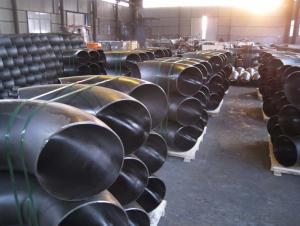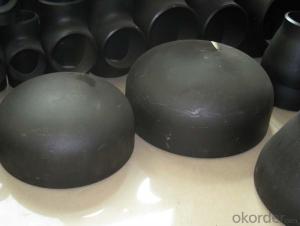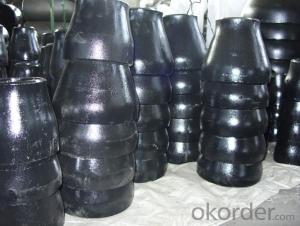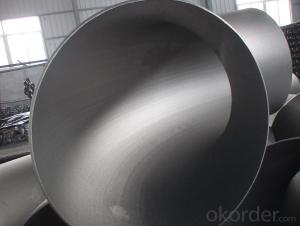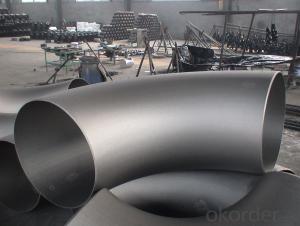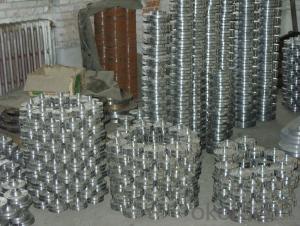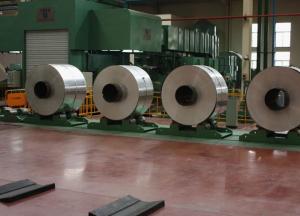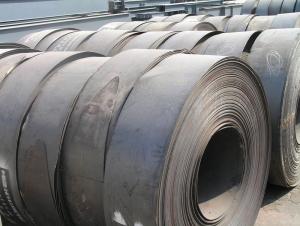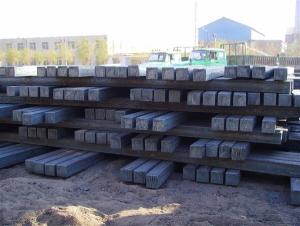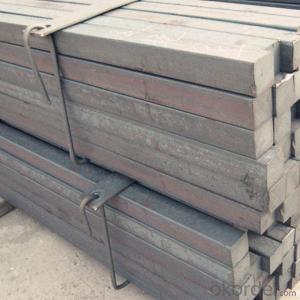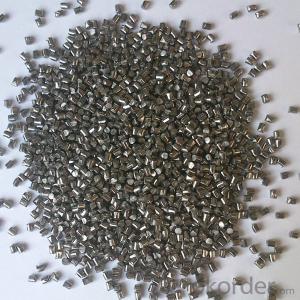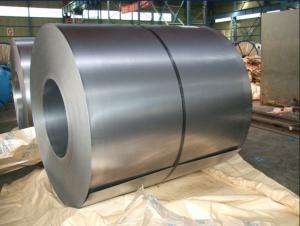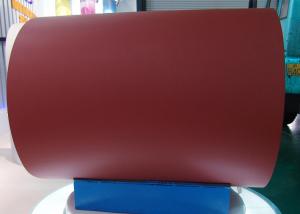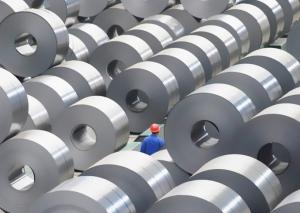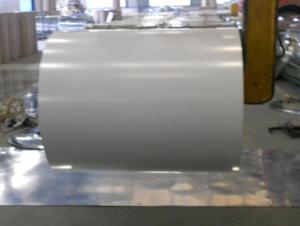Carbon Steel Pipe Fittings LR BEND
- Loading Port:
- China Main Port
- Payment Terms:
- TT OR LC
- Min Order Qty:
- -
- Supply Capability:
- -
OKorder Service Pledge
OKorder Financial Service
You Might Also Like
Specifications
pipe fitting elbow
Certificate:ISO:9001-2000
New material,completely meet asme and din standard
Best price
1. type: AISI ASTM A234 WPB BW Con Elbow
2. Size: 1/2"-48"(1/2"-24"is seamless and 26"-48"is welded)
3. Wall thickness: sch10-160, STD, XS, XXS
4. Material: A234WPB, A420WPL6, A420WP5, WP11, WP12, WP22, etc
5. Welding line: seamless
6. Angle of bend: 30, 45, 90, 180degree
7. Bending radius: SR, LR
8. Standard: ANSI B16.9, JIS, SB, DIN, GB
9. Surface treatment: black paint, vanis paint, black rust-proof oil,
transparent oil, hot galvanizing
10. Application: petroleum, electricity, chemical, natural gas, metallurgy,construction,
shipbuilding and other fields because of its high pressure, high temperature, etc
11. connection: welding
12. technics:forged
13.Certificate:ISO9001 - 2000, CE, SGS, etc.
14. packaging: wooden case, pallet, container or in accordance with the
requirement of customers
15. Principle: quality fist, customer first, credit first
16. payment: L/C T/T
17. delivery time: 7-25 days after payments
18. Notes: the bevel can be made in accordance with the special requirements
of the customers
19. Others: we can also produce the products according to the requirements
of the customers
The main production:
1. PIPE FITTINGS: elbows, tees, bends, reducers, cap, flanges and sockets etc.
2. PIPE: bult welded pipes, seamless pipes, threaded pipes, etc.
We sincerely welcom customers at home and abroad to visit us and seek common development.
- Q:What are the applications of stainless steel in the food industry?
- Stainless steel has numerous applications in the food industry due to its unique properties. It is commonly used in food processing, storage, and equipment manufacturing. Its corrosion resistance makes it ideal for food contact surfaces, ensuring hygiene and preventing contamination. Stainless steel is used in the production of utensils, sinks, countertops, and appliances due to its durability, easy cleaning, and resistance to heat and chemicals. It is also used in food transportation, such as tanks and containers, as it maintains the quality and integrity of the food during transit.
- Q:What are the main properties of steel?
- The main properties of steel include high tensile strength, excellent durability, good heat resistance, and the ability to be easily shaped and welded. It is known for its hardness and toughness, making it suitable for a wide range of applications in construction, manufacturing, and automotive industries. Steel also exhibits good electrical and thermal conductivity, along with corrosion resistance, making it a popular choice for various structural and engineering purposes.
- Q:How is steel used in the production of defense equipment?
- Steel is used extensively in the production of defense equipment due to its strength, durability, and ability to withstand high impact and extreme conditions. It is used to manufacture various components such as armor plates, vehicle frames, weapon systems, and ammunition. The use of steel ensures that defense equipment can withstand the rigors of combat and provide necessary protection and performance for military personnel.
- Q:What are the common types of steel products used in the railway industry?
- The common types of steel products used in the railway industry include rails, wheels, axles, and various structural components such as beams and plates. These steel products are specifically designed to withstand the heavy loads, high speeds, and constant vibrations associated with railway operations.
- Q:What are the different types of steel reinforcement meshes?
- There are several different types of steel reinforcement meshes used in construction, including welded wire mesh, expanded metal mesh, and ribbed or deformed steel bars.
- Q:What are the factors to consider when estimating the lifespan of steel structures?
- When estimating the lifespan of steel structures, several factors need to be considered. These factors include the quality and grade of the steel used, the design and construction techniques employed, the environmental conditions the structure will be exposed to, and the level of ongoing maintenance and inspections carried out. Additionally, factors such as the presence of corrosion protection systems, load-bearing capacity, and the intended use of the structure should also be taken into account. By considering these factors, a more accurate estimation of the lifespan of steel structures can be determined.
- Q:What are the properties of heat-resistant steel for high-temperature applications?
- Heat-resistant steel for high-temperature applications possesses several key properties. Firstly, it has a high melting point, allowing it to withstand extreme temperatures without deformation or failure. Additionally, it exhibits excellent thermal stability, maintaining its mechanical strength and structural integrity even at elevated temperatures. Heat-resistant steel also possesses good oxidation resistance, preventing the formation of scale or oxide layers when exposed to oxygen-rich environments. Furthermore, it has low thermal expansion, reducing the risk of thermal stress and cracking. Lastly, heat-resistant steel often has good creep resistance, enabling it to withstand prolonged exposure to high temperatures without significant deformation or failure.
- Q:How is steel used in the production of automotive components?
- Steel is commonly used in the production of automotive components due to its strength, durability, and cost-effectiveness. It is used in various parts such as body panels, chassis, suspension systems, and engine components. Steel provides the necessary structural integrity and impact resistance needed for safe and reliable vehicles.
- Q:How is steel used in the production of tools and machinery?
- Steel is widely used in the production of tools and machinery due to its high strength and durability. It is commonly employed to manufacture various components, such as blades, gears, shafts, and frames, that require resistance to wear, deformation, and heavy loads. The hardness and toughness of steel make it ideal for cutting, drilling, and shaping materials. Additionally, its ability to be easily machined and welded allows for customization and assembly of complex machinery. Overall, steel's properties make it an essential material in the construction of tools and machinery, ensuring their reliability and efficiency.
- Q:What are the different types of steel beams and their uses?
- There are several types of steel beams commonly used in construction, including I-beams, H-beams, and S-beams. I-beams, also known as W-beams, are shaped like the letter "I" and are widely used for structural support in buildings and bridges. They have high strength-to-weight ratios and are suitable for carrying heavy loads. H-beams, also known as wide flange beams, have a wider flange than I-beams, making them more resistant to bending. They are often used in large structures, such as skyscrapers and industrial buildings. S-beams, also known as American Standard beams, have a tapered flange and are commonly used in residential construction and smaller-scale projects. Each type of steel beam has its own specific uses and advantages, depending on the requirements of the project.
1. Manufacturer Overview |
|
|---|---|
| Location | |
| Year Established | |
| Annual Output Value | |
| Main Markets | |
| Company Certifications | |
2. Manufacturer Certificates |
|
|---|---|
| a) Certification Name | |
| Range | |
| Reference | |
| Validity Period | |
3. Manufacturer Capability |
|
|---|---|
| a)Trade Capacity | |
| Nearest Port | |
| Export Percentage | |
| No.of Employees in Trade Department | |
| Language Spoken: | |
| b)Factory Information | |
| Factory Size: | |
| No. of Production Lines | |
| Contract Manufacturing | |
| Product Price Range | |
Send your message to us
Carbon Steel Pipe Fittings LR BEND
- Loading Port:
- China Main Port
- Payment Terms:
- TT OR LC
- Min Order Qty:
- -
- Supply Capability:
- -
OKorder Service Pledge
OKorder Financial Service
Similar products
New products
Hot products
Related keywords
